新版人教新目标版2020春八年级英语下册Unit9Haveyoueverbeentoamuseum单元综合测试卷九
- 格式:docx
- 大小:172.00 KB
- 文档页数:14
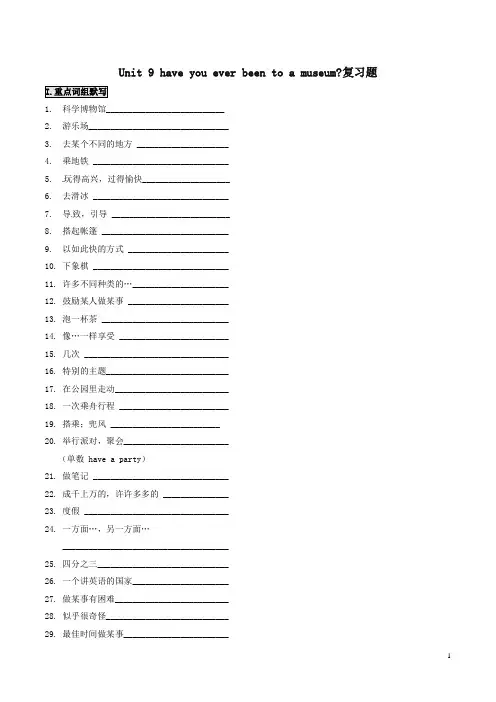
Unit 9 have you ever been to a museum?复习题I.重点词组默写1.科学博物馆___________________________2.游乐场________________________________3.去某个不同的地方 _____________________4.乘地铁 _______________________________5.玩得高兴,过得愉快____________________6.去滑冰 _______________________________7.导致,引导 ___________________________8.搭起帐篷 _____________________________9.以如此快的方式 _______________________10.下象棋 _______________________________11.许多不同种类的…______________________12.鼓励某人做某事 _______________________13.泡一杯茶 _____________________________14.像…一样享受 _________________________15.几次 _________________________________16.特别的主题____________________________17.在公园里走动__________________________18.一次乘舟行程 _________________________19.搭乘;兜风 _________________________20.举行派对,聚会________________________(单数 have a party)21.做笔记 _______________________________22.成千上万的,许许多多的 _______________23.度假 _________________________________24.一方面…,另一方面…______________________________________25.四分之三______________________________26.一个讲英语的国家______________________27.做某事有困难__________________________28.似乎很奇怪____________________________29.最佳时间做某事________________________30.在一个自然环境中 _____________________31.全年,整年 ____________________________32.接近,靠近,在附近 ____________________33.在白天 ________________________________34.在东南亚_______________________________35.介意做某事 ____________________________II. Grammar Focus 默写1.你曾经去过科学博物馆吗?______ you_____ ______ to a science museum?是的,我曾经去过自然博物馆。
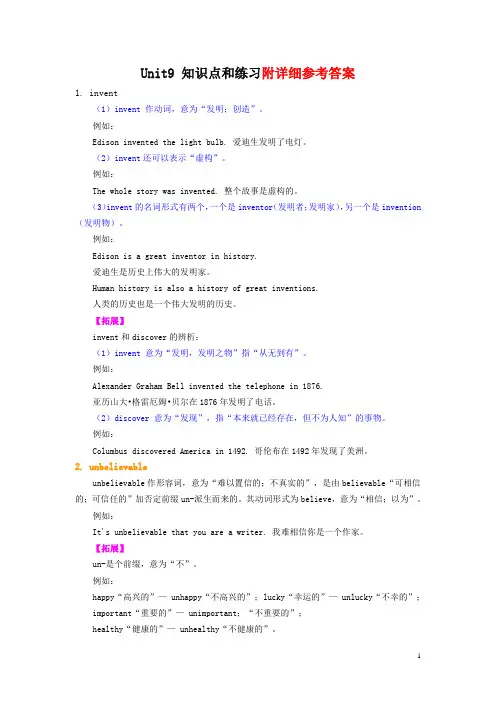
Unit9 知识点和练习附详细参考答案1. invent(1)invent 作动词,意为“发明;创造”。
例如:Edison invented the light bulb. 爱迪生发明了电灯。
(2)invent还可以表示“虚构”。
例如:The whole story was invented. 整个故事是虚构的。
(3)invent的名词形式有两个,一个是inventor(发明者;发明家),另一个是invention (发明物)。
例如:Edison is a great inventor in history.爱迪生是历史上伟大的发明家。
Human history is also a history of great inventions.人类的历史也是一个伟大发明的历史。
【拓展】invent和discover的辨析:(1)invent 意为“发明,发明之物”指“从无到有”。
例如:Alexander Graham Bell invented the telephone in 1876.亚历山大•格雷厄姆•贝尔在1876年发明了电话。
(2)discover 意为“发现”,指“本来就已经存在,但不为人知”的事物。
例如:Columbus discovered America in 1492. 哥伦布在1492年发现了美洲。
2. unbelievableunbelievable作形容词,意为“难以置信的;不真实的”,是由believable“可相信的;可信任的”加否定前缀un-派生而来的。
其动词形式为believe,意为“相信;以为”。
例如:It's unbelievable that you are a writer. 我难相信你是一个作家。
【拓展】un-是个前缀,意为“不”。
例如:happy“高兴的”— unhappy“不高兴的”;lucky“幸运的”— unlucky“不幸的”;important“重要的”— unimportant;“不重要的”;healthy“健康的”— unhealthy“不健康的”。
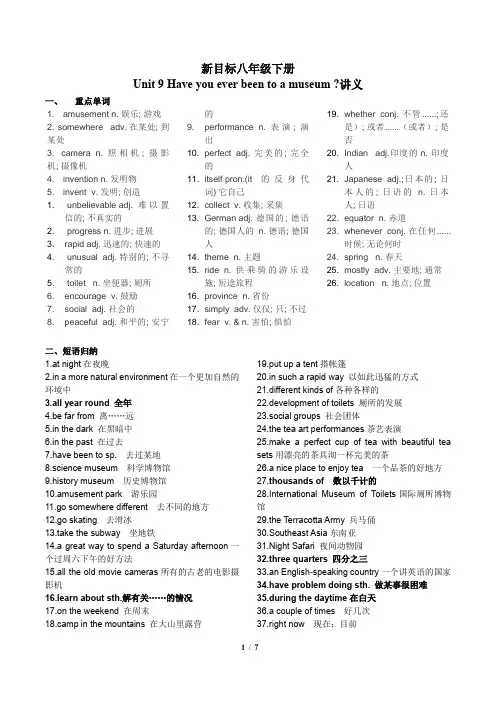
新目标八年级下册Unit 9 Have you ever been to a museum ?讲义一、重点单词1. amusement n. 娱乐; 游戏2. somewhere adv. 在某处; 到某处3. camera n. 照相机; 摄影机; 摄像机4. invention n. 发明物5. invent v. 发明; 创造1. unbelievable adj. 难以置信的; 不真实的2. progress n. 进步; 进展3. rapid adj. 迅速的; 快速的4. unusual adj. 特别的; 不寻常的5. toilet n. 坐便器; 厕所6. encourage v. 鼓励7. social adj. 社会的8. peaceful adj. 和平的; 安宁的9. performance n. 表演; 演出10. perfect adj. 完美的; 完全的11. itself pron.(it的反身代词) 它自己12. collect v. 收集; 采集13. German adj. 德国的; 德语的; 德国人的n. 德语; 德国人14. theme n. 主题15. ride n. 供乘骑的游乐设施; 短途旅程16. province n. 省份17. simply adv. 仅仅; 只; 不过18. fear v. & n. 害怕; 惧怕19. whether conj. 不管......;还是); 或者......(或者); 是否20. Indian adj.印度的 n. 印度人21. Japanese adj.;日本的; 日本人的; 日语的n. 日本人; 日语22. equator n. 赤道23. whenever conj. 在任何......时候; 无论何时24. spring n. 春天25. mostly adv. 主要地; 通常26. location n. 地点; 位置二、短语归纳1.at night在夜晚2.in a more natural environment在一个更加自然的环境中3.all year round 全年4.be far from 离……远5.in the dark 在黑暗中6.in the past 在过去7.have been to sp. 去过某地8.science museum 科学博物馆9.history museum 历史博物馆10.amusement park 游乐园11.go somewhere different 去不同的地方12.go skating 去滑冰13.take the subway 坐地铁14.a great way to spend a Saturday afternoon一个过周六下午的好方法15.all the old movie cameras所有的古老的电影摄影机16.learn about sth.解有关……的情况17.on the weekend 在周末18.camp in the mountains 在大山里露营19.put up a tent搭帐篷20.in such a rapid way 以如此迅猛的方式21.different kinds of各种各样的22.development of toilets 厕所的发展23.social groups 社会团体24.the tea art performances茶艺表演25.make a perfect cup of tea with beautiful tea sets用漂亮的茶具沏一杯完美的茶26.a nice place to enjoy tea 一个品茶的好地方27.thousands of 数以千计的28.International Museum of Toilets国际厕所博物馆29.the Terracotta Army 兵马俑30.Southeast Asia东南亚31.Night Safari 夜间动物园32.three quarters 四分之三33.an English-speaking country一个讲英语的国家34.have problem doing sth. 做某事很困难35.during the daytime在白天36.a couple of times 好几次37.right now 现在;目前38.an amusement park with a special theme一个有特别的主题的游乐园39.walk around the park 在公园里到处走40.hear of 听说41.take a ride兜风42.another province另一个省43.the Bird’s Nest鸟巢44.encourage sb. to do sth.鼓励某人做某事45.on the one hand... on the other hand.一方面,另一方面三、句型集萃1.a great way to do sth一个做某事的好办法2.It’s unbelievable that很难相信……3.watch sb do sth.看某人做了某事4.encourage sb to do sth鼓励某人做某事5.as..as和。
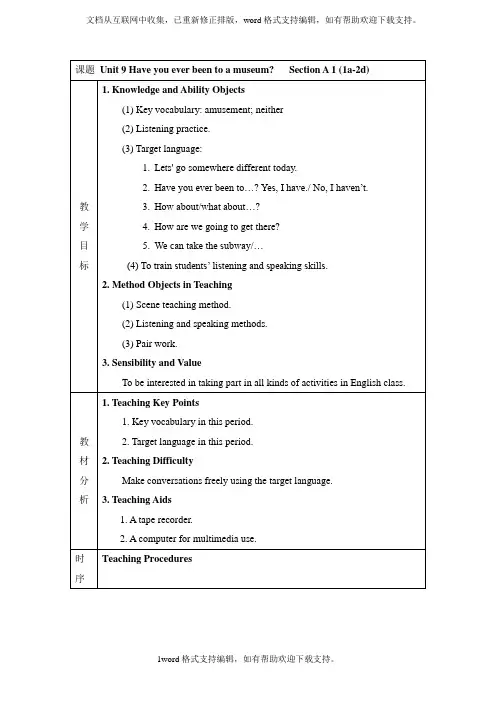
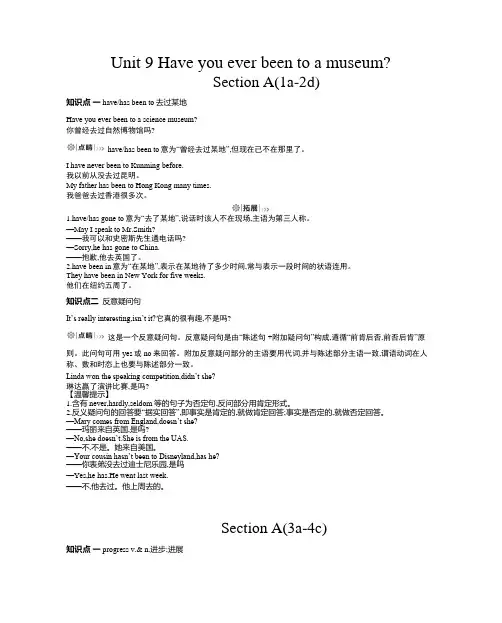
Unit 9 Have you ever been to a museum?Section A(1a-2d)知识点一have/has been to去过某地Have you ever been to a science museum?你曾经去过自然博物馆吗?have/has been to意为“曾经去过某地”,但现在已不在那里了。
I have never been to Kunming before.我以前从没去过昆明。
My father has been to Hong Kong many times.我爸爸去过香港很多次。
1.have/has gone to意为“去了某地”,说话时该人不在现场,主语为第三人称。
—May I speak to Mr.Smith?——我可以和史密斯先生通电话吗?—Sorry,he has gone to China.——抱歉,他去英国了。
2.have been in意为“在某地”,表示在某地待了多少时间,常与表示一段时间的状语连用。
They have been in New York for five weeks.他们在纽约五周了。
知识点二反意疑问句It’s really interesting,isn’t it?它真的很有趣,不是吗?这是一个反意疑问句。
反意疑问句是由“陈述句 +附加疑问句”构成,遵循“前肯后否,前否后肯”原则。
此问句可用yes或no来回答。
附加反意疑问部分的主语要用代词,并与陈述部分主语一致,谓语动词在人称、数和时态上也要与陈述部分一致。
Linda won the speaking competition,didn’t she?琳达赢了演讲比赛,是吗?【温馨提示】1.含有never,hardly,seldom等的句子为否定句,反问部分用肯定形式。
2.反义疑问句的回答要“据实回答”,即事实是肯定的,就做肯定回答;事实是否定的,就做否定回答。
—Mary comes from England,doesn’t she?——玛丽来自英国,是吗?—No,she doesn’t.She is from the UAS.——不,不是。
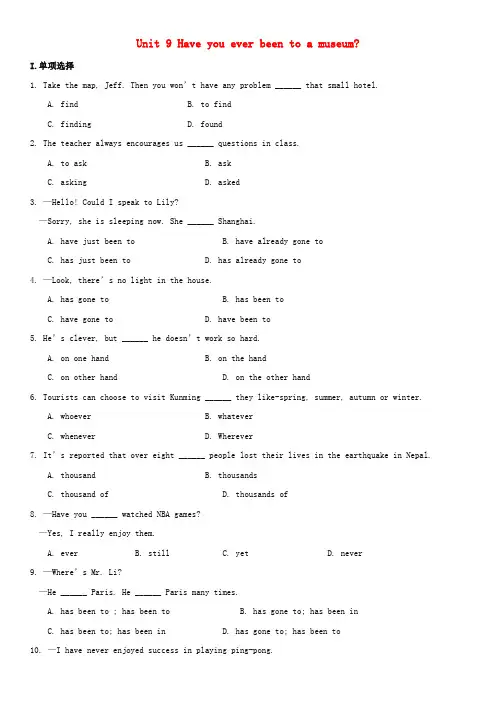
Unit 9 Have you ever been to a museum?I.单项选择1. Take the map, Jeff. Then you won’t have any problem ______ that small hotel.A. findB. to findC. findingD. found2. The teacher always encourages us ______ questions in class.A. to askB. askC. askingD. asked3. —Hello! Could I speak to Lily?—Sorry, she is sleeping now. She ______ Shanghai.A. have just been toB. have already gone toC. has just been toD. has already gone to4. —Look, there’s no light in the house.A. has gone toB. has been toC. have gone toD. have been to5. He’s clever, but ______ he doesn’t work so hard.A. on one handB. on the handC. on other handD. on the other hand6. Tourists can choose to visit Kunming ______ they like-spring, summer, autumn or winter.A. whoeverB. whateverC. wheneverD. Wherever7. It’s reported that over eight ______ people lost their lives in the earthqua ke in Nepal.A. thousandB. thousandsC. thousand ofD. thousands of8. —Have you ______ watched NBA games?—Yes, I really enjoy them.A. everB. stillC. yetD. never9. —Where’s Mr. Li?—He ______ Paris. He ______ Paris many times.A. has been to ; has been toB. has gone to; has been inC. has been to; has been inD. has gone to; has been to10. —I have never enjoyed success in playing ping-pong.—Me ______ .A. neitherB. tooC. alsoD. notII.根据句意及汉语提示填入恰当的单词1. I bought a new ______________ (照相机) from the supermarket last week.2. It's ______________________ (难以置信的) that the boy can carry such a huge stone.3. I tell him to come back ______________ (无论何时) he wants to.4. Many children like to fly kites in __________ (春天).5. She ____________ (害怕) that she might not find him in his office.III.用所给单词的正确形式填空1. These __________ (Japan) came to China yesterday. They will visit the Great Wall.2. We met many ___________ (fox) in the forest.3. It's ___________(safety) to cross the road when it is a green light.4. People in Singapore ___________ (most) speak Chinese and English.5. We can buy different kinds of ___________ (India) food in the supermarket.6. Three _________ (quarter) of the earth is ocean.7. It’s a __________ (real) interesting job.8. A moment ago ________________ (thousand) of birds flew over our city.9. It’s ___________ ( believable) that he didn’t know the accident until we told him.10.The story__________(it) is moving, so I was moved.IV. 完成句子1. 这座山终年积雪。
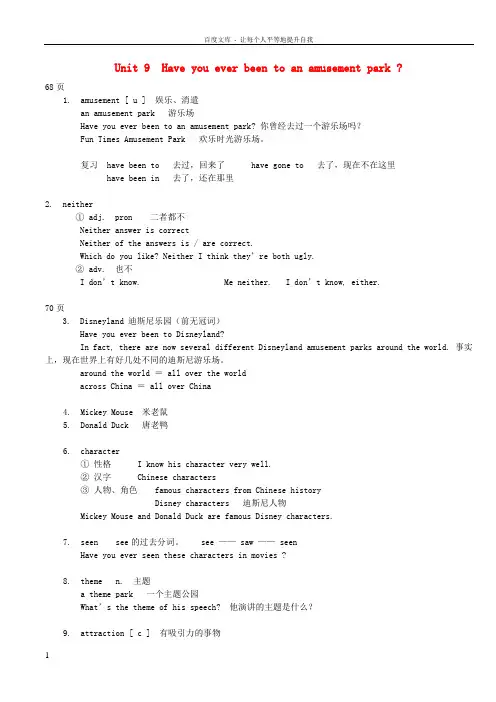
Unit 9 Have you ever been to an amusement park ?68页1.amusement [ u ] 娱乐、消遣an amusement park 游乐场Have you ever been to an amusement park? 你曾经去过一个游乐场吗?Fun Times Amusement Park 欢乐时光游乐场。
复习have been to 去过,回来了have gone to 去了,现在不在这里have been in 去了,还在那里2. neither① adj. pron 二者都不Neither answer is correctNeither of the answers is / are correct.Which do you like? Neither I think they’re both ugly.② adv. 也不I don’t know. Me neither. I don’t know, either.70页3. Disneyland 迪斯尼乐园(前无冠词)Have you ever been to Disneyland?In fact, there are now several different Disneyland amusement parks around the world. 事实上,现在世界上有好几处不同的迪斯尼游乐场。
around the world = all over the worldacross China = all over China4. Mickey Mouse 米老鼠5. Donald Duck 唐老鸭6. character①性格I know his character very well.②汉字Chinese characters③人物、角色famous characters from Chinese historyDisney characters 迪斯尼人物Mickey Mouse and Donald Duck are famous Disney characters.7. seen see的过去分词。
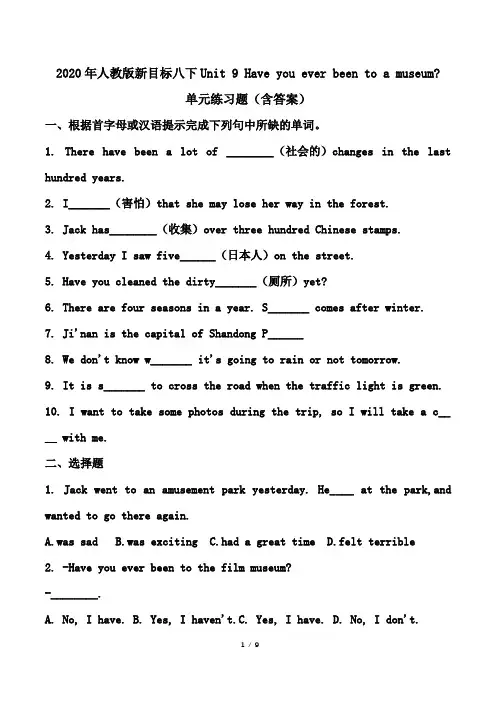
2020年人教版新目标八下Unit 9 Have you ever been to a museum?单元练习题(含答案)一、根据首字母或汉语提示完成下列句中所缺的单词。
1. There have been a lot of ________(社会的)changes in the last hundred years.2. I_______(害怕)that she may lose her way in the forest.3. Jack has________(收集)over three hundred Chinese stamps.4. Yesterday I saw five______(日本人)on the street.5. Have you cleaned the dirty_______(厕所)yet?6. There are four seasons in a year. S_______ comes after winter.7. Ji'nan is the capital of Shandong P______8. We don't know w_______ it's going to rain or not tomorrow.9. It is s_______ to cross the road when the traffic light is green.10. I want to take some photos during the trip, so I will take a c___ with me.二、选择题1. Jack went to an amusement park yesterday. He____ at the park,and wanted to go there again.A.was sadB.was excitingC.had a great timeD.felt terrible2. -Have you ever been to the film museum?-________.A. No, I have.B. Yes, I haven't.C. Yes, I have.D. No, I don't.3. -He has never been to the water park,has he?-____ .He's going there tomorrow.A. Yes,he hasn't.B. No,he has.C. Yes,he has.D. No,he hasn't.4. ______ of my parents likes music.A. BothB. NeitherC. AllD. Every5. -_____ are you going to get there?-We can take the subway.A. WhatB. WhoC. HowD. Why6. -I'm sorry, Lucy. I have ______.your computer for such a long time.-Never mind.A.borrowedB.lentC.keptD.returned7. His hobby is ______ collecting stamps. It's taking photos listening to music.A.either;orB.neither;norC.not;butD.both;and8. As they had no map with them,they had problem ____ the hotel.A.findB.findsC.foundD.finding9. When I was a young girl,all I wanted to do was to fly to Beijing.A.thatB. /C.whichD.in which10. -_you the Chinese food?-Not yet.A. Did;tryB. Have;triedC. Has;triedD. Do;try11. -I have never enjoyed success in playing ping -pong.-Me_______..A.neitherB.tooC.alsoD.not12. -Where's Mr. Li? -He _______ Paris. He _______ Paris many times.A.has been to;has been toB.has gone to;has been inC.has been to;has beon inD.has gone to;has been to13. -Have you _______ watched NBA games? -Yes, I really enjoy them.A.everB.stillC.yetD.never14. It's reported that over eight _______ people lost their lives in the earthquake in Nepal.A.thousandB.thousandsC.thousand ofD.thousands of15. Tourists can choose to visit Kunming __________ autumn or winter, they like-spring, summer.A.whoeverB.whateverC.wheneverD. Wherever三、完形填空Travel is useful to us in at least three ways.First,by traveling we can enjoy the beautiful scenery of different 1 , We can see 2 our own eyes many places which can be read about in books,and visit some famous cities and scenic spots.Second,we will 3 people with different interests and see strange and different things when we travel. We can get to know the 4 of the people in other countries,taste different foods and local flavors(当地风味)if we like. 5 this way,we can understand 6 differently other people live.Third,travel will not only help us to 7 knowledge of geography and history, 8 will also help us keep healthy and make us 9 narrow-minded(偏执的)。
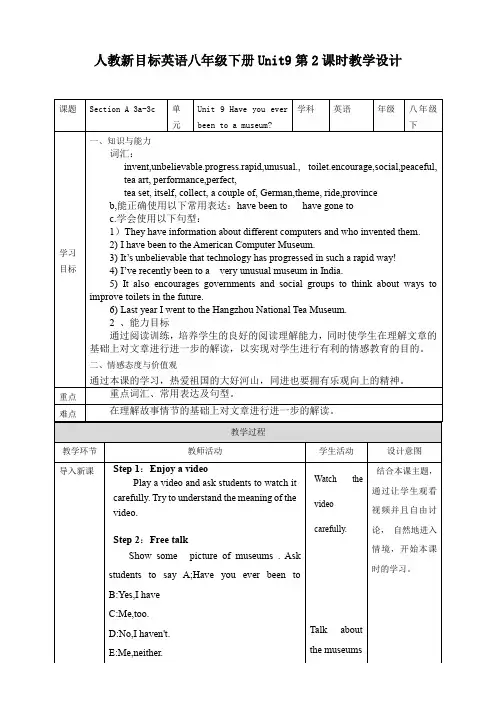
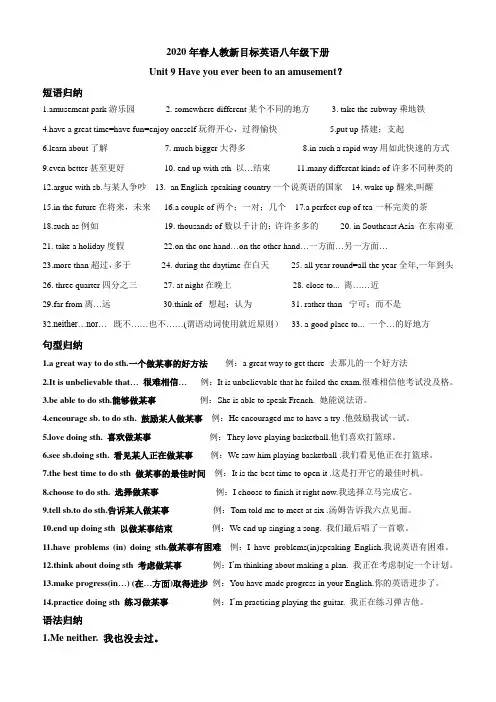
2020年春人教新目标英语八年级下册Unit 9 Have you ever been to an amusement?短语归纳1.amusement park游乐园2. somewhere different某个不同的地方3. take the subway乘地铁4.have a great time=have fun=enjoy oneself玩得开心,过得愉快5.put up搭建;支起6.learn about了解7. much bigger大得多8.in such a rapid way用如此快速的方式9.even better甚至更好10. end up with sth 以…结束11.many different kinds of许多不同种类的12.argue with sb.与某人争吵13. an English-speaking country 一个说英语的国家14. wake up醒来,叫醒15.in the future在将来,未来16.a couple of两个;一对;几个17.a perfect cup of tea一杯完美的茶18.such as例如19. thousands of数以千计的;许许多多的20. in Southeast Asia 在东南亚21. take a holiday 度假22.on the one hand…on the other hand…一方面…另一方面…23.more than超过,多于24. during the daytime在白天25. all year round=all the year全年,一年到头26. three quarter四分之三27. at night在晚上28. close to... 离……近29.far from离…远30.think of 想起;认为31. rather than 宁可;而不是32.neither…nor…既不……也不……(谓语动词使用就近原则)33. a good place to... 一个…的好地方句型归纳1.a great way to do sth.一个做某事的好方法例:a great way to get there 去那儿的一个好方法2.It is unbelievable that…很难相信…例:It is unbelievable that he failed the exam.很难相信他考试没及格。
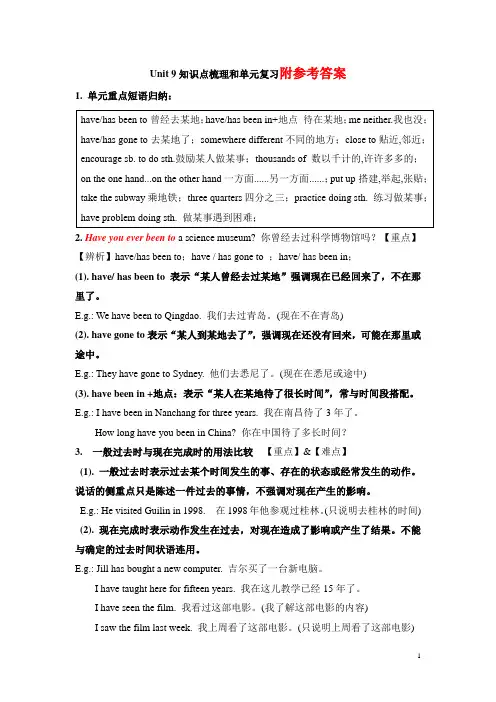
Unit 9知识点梳理和单元复习附参考答案1. 单元重点短语归纳:2. Have you ever been to a science museum? 你曾经去过科学博物馆吗?【重点】【辨析】have/has been to;have / has gone to ;have/ has been in;(1). have/ has been to 表示“某人曾经去过某地”强调现在已经回来了,不在那里了。
E.g.: We have been to Qingdao. 我们去过青岛。
(现在不在青岛)(2). have gone to表示“某人到某地去了”,强调现在还没有回来,可能在那里或途中。
E.g.: They have gone to Sydney. 他们去悉尼了。
(现在在悉尼或途中)(3). have been in +地点:表示“某人在某地待了很长时间”,常与时间段搭配。
E.g.: I have been in Nanchang for three years. 我在南昌待了3年了。
How long have you been in China? 你在中国待了多长时间?3. 一般过去时与现在完成时的用法比较【重点】&【难点】(1). 一般过去时表示过去某个时间发生的事、存在的状态或经常发生的动作。
说话的侧重点只是陈述一件过去的事情,不强调对现在产生的影响。
E.g.: He visited Guilin in 1998. 在1998年他参观过桂林。
(只说明去桂林的时间)(2). 现在完成时表示动作发生在过去,对现在造成了影响或产生了结果。
不能与确定的过去时间状语连用。
E.g.: Jill has bought a new computer. 吉尔买了一台新电脑。
I have taught here for fifteen years. 我在这儿教学已经15年了。
I have seen the film. 我看过这部电影。
单元综合测试卷九(Unit 9)时间:120分钟满分:120分姓名:分数:听力部分 (25分)一、听力。
第一节听小对话,从A、B、C三个选项中选出正确的选项,回答问题。
对话读两遍。
(5分)1.M:Have you ever been to the Bird's Nest or the Great Wall,Sarah?W:Neither.However,I went to the Terracotta Army last summer.2.W:I bought a watch for my grandpa.How about you,Tony?M:My grandpa enjoys taking photos,so I sent him a camera.3.M:Lisa.This summer I've ever been to a tea museum and a toilet museum,and my sister Ann has visited a space museum.What about you?W:You are luckier than me.I only went to a history museum.4.W:Have you seen Donald or Mickey Mouse in Shanghai Disneyland yet?M:Of course I have,but I was too busy to see Snow White there.5.M:Who has ever helped you in Hong Kong?A Japanese or an Indian?W:Neither.He is a kind German.Now I still keep in touch with him.(B)1.Where has Sarah been?A.To the Bird's Nest.B.To the Terracotta Army.C.To the Great Wall.(C)2.What did Tony buy for his grandpa?A.A watch.B.A phone.C.A camera.(B)3.Which museum has Ann ever been to?A.A toilet museum.B.A space museum.C.A history museum.(C)4.Which character hasn't the boy seen in Shanghai Disneyland?A.Donald.B.Mickey Mouse.C.Snow White.(B)5.Who has ever helped the girl in Hong Kong?A.A Japanese.B.A German.C.An Indian.第二节听长对话,从A、B、C三个选项中选出正确的选项,回答问题。
Unit 9 Have you ever been to a museum?默写1 Section A 1a~2d一、默写课文中的单词。
1. 照相机;摄影机;摄像机 ______2. amusement n. ______3. somewhere adv. ______4. invention n. ______二、默写课文中的短语。
1. 游乐场 ______2. 去过 ______3. 科学博物馆 ______4. 某个不同的地方 ______5. 太空博物馆 ______6. 玩得很开心 ______7. 了解;获知 ______ 8. 彩色电影 ______9. 电影摄像机 ______ 10. 搭建 ______三、根据汉语提示完成下列句子。
1. 你曾经去过一家科学博物馆吗?______ you ______ ______ ______ a science museum?2. 弗兰克在水上公园玩得很开心。
Frank ______ ______ ______ ______ at the water park.3. 约翰从没有去过太空博物馆。
John ______ ______ ______ ______ the space museum.4. 你曾经去过那儿吗?Have you ever ______ ______ ?5. 它是一个度过周六下午的好方式。
It’s a great way ______ ______ a Saturday afternoon.6. 我还了解一些发明,它们成就了彩色电影。
I learned about the inventions that ______ ______ color movies, too.7. 我从未野营过。
I’ve never ______ ______ .知识积累somewhere与 anywhere的用法辨析:相同点:都表示“在某处”。
不同点:somewhere多用于肯定句中;anywhere多用于疑问句和否定句中。
人教新目标版英语八下Unit 9《Have you ever been to a museum》教学设计一. 教材分析人教新目标版英语八下Unit 9《Have you ever been to a museum》主要讨论人们参观博物馆的经历。
通过本节课的学习,学生将能够运用一般过去时谈论他们的经历,并学会如何询问别人是否参观过某个地方。
本节课的主要语言点包括一般过去时的运用、现在完成时的运用以及与参观地点相关的词汇和表达方式。
二. 学情分析在学习本节课之前,学生已经学习了一般过去时和现在完成时,并掌握了一些与旅行和参观相关的词汇。
因此,他们在学习本节课时具备一定的语言基础。
然而,部分学生可能对如何运用一般过去时和现在完成时进行有效的交流还存在困难,因此需要教师在教学过程中给予特别的关注和指导。
三. 教学目标1.学生能够熟练运用一般过去时和现在完成时谈论参观经历。
2.学生能够掌握与参观地点相关的词汇和表达方式。
3.学生能够在日常生活中运用所学知识进行有效的交流。
四. 教学重难点1.教学重点:一般过去时和现在完成时的运用,与参观地点相关的词汇和表达方式。
2.教学难点:一般过去时和现在完成时的交替使用,以及如何在实际情境中进行有效的交流。
五. 教学方法1.情境教学法:通过设定情境,让学生在实际语境中运用所学知识。
2.任务型教学法:通过完成各种任务,促进学生的积极参与和实际操作。
3.交际法:鼓励学生进行互动交流,提高他们的口语表达能力。
六. 教学准备1.教师准备相关博物馆的图片、视频等教学素材。
2.准备一些关于参观经历的卡片,用于学生之间的互动练习。
3.设计好各个教学环节的具体内容和时间安排。
七. 教学过程1.导入(5分钟)教师通过展示一些博物馆的图片和视频,引导学生谈论他们所了解的博物馆。
然后,教师提问:“Have you ever been to a museum?”, 让学生用一般过去时回答。
2.呈现(10分钟)教师呈现本节课的主要内容,包括一般过去时的运用、现在完成时的运用以及与参观地点相关的词汇和表达方式。
单元综合测试卷九(Unit 9)时间:120分钟满分:120分姓名:分数:听力部分 (25分)一、听力。
第一节听小对话,从A、B、C三个选项中选出正确的选项,回答问题。
对话读两遍。
(5分)1.M:Have you ever been to the Bird's Nest or the Great Wall,Sarah?W:Neither.However,I went to the Terracotta Army last summer.2.W:I bought a watch for my grandpa.How about you,Tony?M:My grandpa enjoys taking photos,so I sent him a camera.3.M:Lisa.This summer I've ever been to a tea museum and a toilet museum,and my sister Ann has visited a space museum.What about you?W:You are luckier than me.I only went to a history museum.4.W:Have you seen Donald or Mickey Mouse in Shanghai Disneyland yet?M:Of course I have,but I was too busy to see Snow White there.5.M:Who has ever helped you in Hong Kong?A Japanese or an Indian?W:Neither.He is a kind German.Now I still keep in touch with him.(B)1.Where has Sarah been?A.To the Bird's Nest.B.To the Terracotta Army.C.To the Great Wall.(C)2.What did Tony buy for his grandpa?A.A watch.B.A phone.C.A camera.(B)3.Which museum has Ann ever been to?A.A toilet museum.B.A space museum.C.A history museum.(C)4.Which character hasn't the boy seen in Shanghai Disneyland?A.Donald.B.Mickey Mouse.C.Snow White.(B)5.Who has ever helped the girl in Hong Kong?A.A Japanese.B.A German.C.An Indian.第二节听长对话,从A、B、C三个选项中选出正确的选项,回答问题。
对话读两遍。
(10分)听下面一段长对话,回答6、7两个问题。
M:Jenny,have you ever been to Shanghai Disneyland Park?W:Yes,I have.I went there with my mother last summer vacation.M:What did you do there?W:I took photos,ate delicious food and bought some gifts for my cousins. M:Did you have a great time there?W:Sure.We enjoyed ourselves.(B)6.Who went to Shanghai Disneyland Park?A.Jenny and her aunt.B.Jenny and her mother.C.Jenny and her cousins.(B)7.What did Jenny do in Shanghai Disneyland Park?A.Took a boat.B.Ate delicious food.C.Bought some gifts for her friends.听下面一段较长对话,回答8~10三个问题。
W:Jack,I hear there are some great museums in your city,right?M:That's true.And I've been to most of them.W:Which museum do you think is the most interesting?M:The Toilet Museum.You can see many interesting things there.W:Sounds fun.And which museum is the most boring?M:The History Museum.All things in it are old and broken!W:But they're educational.Which museum would you like to visit again?M:The Space Museum.I also want to go to the Science Museum because I haven't been there.(A)8.What does Jack think of the Toilet Museum?A.Interesting.B.Boring.cational.(C)9.Which museum has NOT Jack been to?A.The History Museum.B.The Space Museum.C.The Science Museum.(C)10.How many museums are mentioned(被提及) in the talk?A.Two.B.Three.C.Four.第三节听下面一段独白,从A、B、C三个选项中选出正确的选项,回答问题。
独白读两遍。
(10分)(W)My name is Mary.I am now in France as an exchange student.I live with the Smiths,my host family.There are too many rules in the house.I have to be home by 10:00 p.m.,and I have to go to bed before 11:00 p.m.I can't stay out late on weekends.If I don't want to have dinner at home,I must let them know before 6:00 p.m.I have to clean up my bedroom before leaving the house.What's more,I must be quiet in the house.The rules really make me feel uncomfortable.Until now I realize that nowhere is better than home.(A)11.What does Mary do in France?A.She studies there.B.She works there.C.She runs a shop there.(B)12.How does she like the host family?A.She likes it.B.She dislikes it.C.She doesn't mind it.(C)13.When does she have to get back home?A.By 6:00 p.m.B.By 11:00 p.m.C.By 10:00 p.m.(A)14.What is she expected to do before leaving the house?A.Clean up the bedroom.B.Take exercise.C.Do the dishes.(B)15.What makes Mary feel uncomfortable?A.Too much housework.B.Too many rules.C.Too many different customs.笔试部分 (95分)二、完形填空。
(15分)阅读下面短文,掌握其大意,然后从每题所给的A、B、C、D四个选项中选出最佳选项。
Last weekend,the four members of my family spent an excellent holiday at the Disneyland.And one thing made our visit seem 16 .We got to the front of the line at Space Mountain,only to find out that our little daughter Gloria couldn't take her 17 on the ride.It is our first timeto be there,so we were too 18 to remember that ice-cream was not allowed on the ride.Gloria started 19 and we all don't know what to do.Then Tony,one of the staff(员工) members,came over.He bent(弯腰) down and told Gloria that he would20 the ice-cream for her and give it to her when she finished the ride.Gloria said,“Really?” Then she gave Tony her ice-cream,and enjoyed 21 on the ride.Sure enough,when we 22 ,there was Gloria's new friend 23 “her” ice-cream.Now you and I both know what happened,24 we know that an ice-cream won't last thirty 25 on a summer afternoon in Florida.Tony knew clearly26 we would get off the ride.He went to the nearest shop and 27 a new ice-cream half a minute before we walked out of the exit(出口).Gloria said,“ 28 .” But I'm sure she didn't know it was a 29 ice-cream.Thanks so much for giving us 30 and making our visit pleasant!(B)16.A.boring B.special C.long D.dangerous(D)17.A.toy B.book C.water D.ice-cream(B)18.A.tired B.excited C.angry D.sad(A)19.A.crying ughing C.playing D.working(B)20.A.eat B.keep C.drop D.choose(C)21.A.himself B.yourself C.herself D.themselves(B)22.A.took off B.came back C.ran away D.gave away(A)23.A.with B.on C.in D.from(D)24.A.but B.so C.although D.because(A)25.A.minutes B.hours C.days D.months(B)26.A.where B.when C.how D.why(C)27.A.had B.made C.bought D.tried(B)28.A.Sorry B.Thank you C.You're welcome D.Not at all(A)29.A.different B.delicious C.cheap D.free(C)30.A.tickets rmation C.help D.money三、阅读理解。